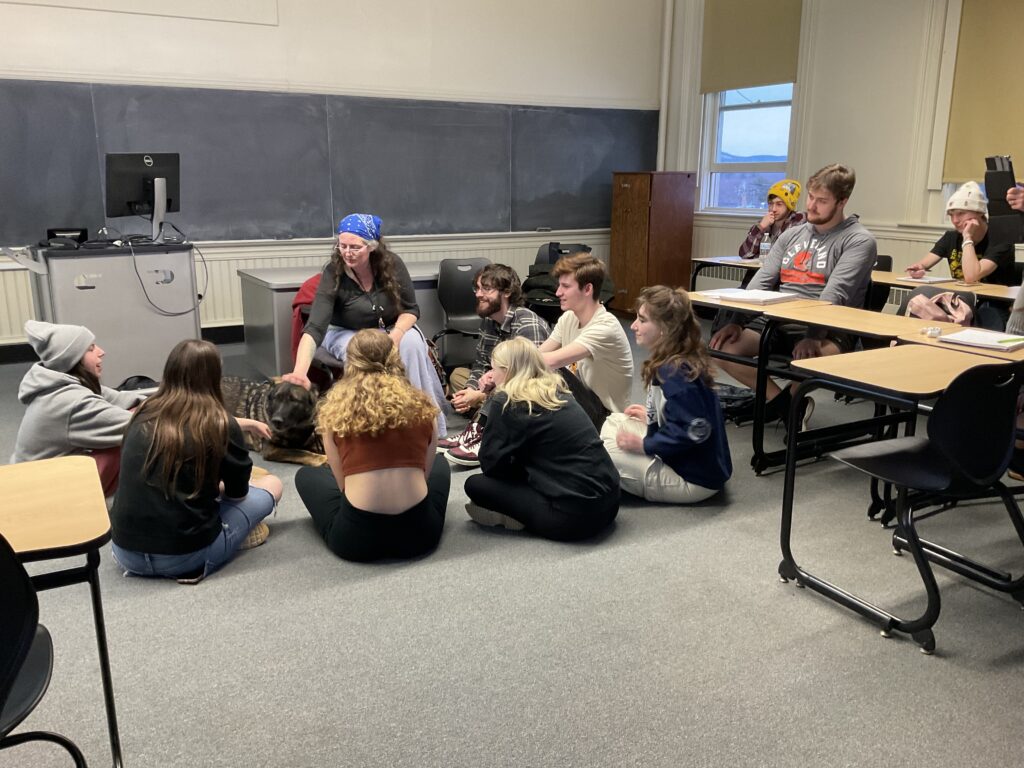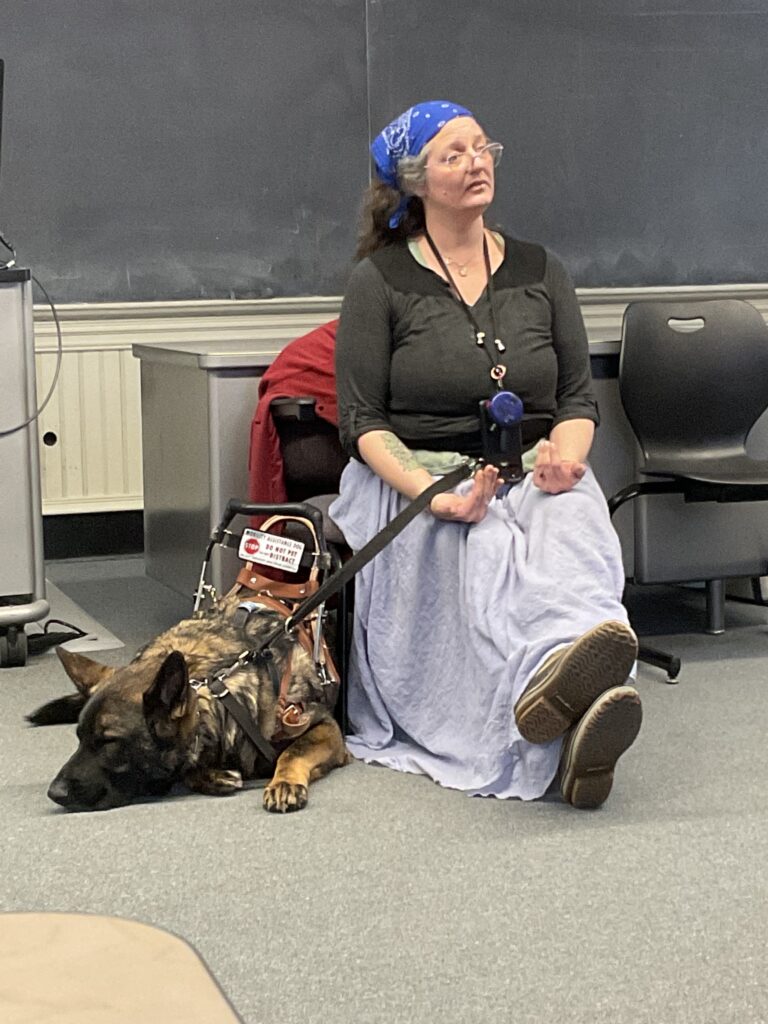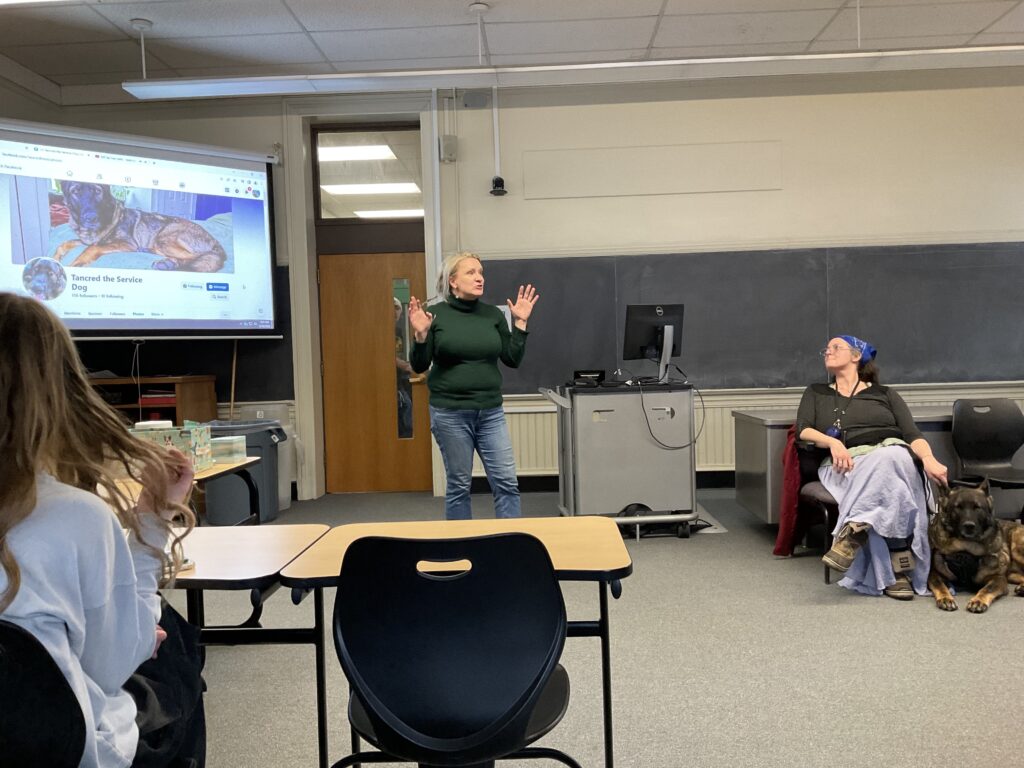Side By Side 24/7: A Poet and Her Pup Teach the Power of Pets

Despite a cold winter day on the Plymouth State University campus, the vibe was warm and cheerful inside Room 203 in Rounds Hall this past February. It was all thanks to published poet and former PSU English instructor Ivy Page, and her Service Dog, Tancred. The pair joined students for Christine Carpenter’s Composition class focused on the positive impact of Human-Animal Interaction. Ivy and Tancred are one example of symbiotic relationships students learn about during the course.

(Ivy Page and service dog Tancred)
Tancred, a muscular four-year-old East German Shepherd, helps Ivy manage anxiety, Lyme disease, and a rare, genetic hypermobility disorder called Hypermobile Ehlers-Danlos syndrome. That condition causes dislocated joints and chronic pain. Ivy told the class, “Tripping and falling are a constant worry.” Luckily, Tancred is always by her side. He is trained to pull Ivy out of a chair, help her remain stable on her feet, and brace her when she falls. He can also perform compression therapy if Ivy is in distress. During her visit, students observed Ivy simulating a panic attack. As soon as she started breathing heavily, Tancred immediately got up and looked at her. As Ivy explained, “He looks to me and I can say, “pressure,” and he’ll lay across my lap, or pull me out of a chair and we’ll sit down, and he’ll lay across my legs, that’s deep pressure therapy.” Ivy added that it feels like the comfort and security you can get from a weighted blanket.
Carpenter came up with the idea for this course approach about three months after adopting her first dog. “For years, my two young sons asked (begged!) for a dog. I always wanted one, but it never felt like the right time to take on another responsibility. Despite sleepless nights, and losing several pairs of shoes, we fell in love with our new puppy—Ellis. It was clear from the start Ellis was helping us each feel a joy and an emotional healing we hadn’t experienced before. I finally understood what family and friends had shared about the impact pets had on their lives. I thought ‘the power of pets’ would be an interesting theme to explore with writing students.” Carpenter has been teaching this theme in Composition since the spring of 2019.
Director of Composition at PSU, Elliott Gruner observes that “there is an authenticity to this level of student engagement” which contributes to a sense of connectedness that can be a big force in a writer’s development. Other sections of Composition provide meaningful writing instruction and a critical foundation for Plymouth State’s “Cluster” experience through diverse themes such as music, paddleboarding, ceramics, visual culture and storytelling, and hiking the White Mountains.

(Composition Instructor Christine Carpenter and guests Ivy Page and service dog Tancred)
Carpenter believes writers learn best in themed composition classes because they encourage students to dive deeply into subjects that matter to them. Says Carpenter, “I find students are more likely to lean into the writing process, think deeply, and raise questions when they are interested in a topic. Most students enter the class with some personal connection to the pet theme. They have (or had) a family pet in their life. Some students write about their grief over losing a pet. Others describe how a particular pet helped them survive stressful times in life. These perspectives and experiences provide a rich well for personal writing. Students also read related articles, essays and books, and conduct research in line with the course theme. A variety of guests visit the class to share their own stories.

(Ivy Page, service dog Tancred, and students in Christine Carpenter’s Spring 2023 Cluster Composition course)
During Ivy Page’s class visit, a student asked Ivy what her life would be like without Tancred. “If I did not have him, I would spend much more time self-isolating and not be brave enough to go out alone.” She added, “He gives me a huge amount of confidence to do things and a sense of protection too, and helps me participate in the world.” Before the end of class, Ivy removed Tancred’s harness. That signaled he was free to roam the classroom so students could say hello and pet him. “He’s shy” Ivy explained. She got up and nudged him along, perhaps, as if to say, “It’s okay, I’m here for you too.”
For additional information about Ivy Page and her poetry, check out her website: www.poeticentanglement.com



